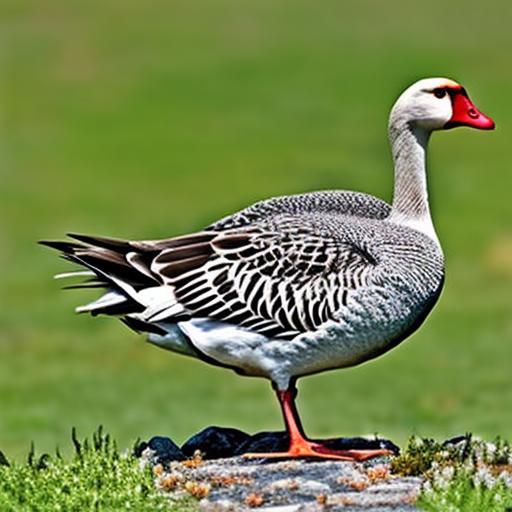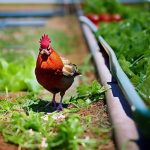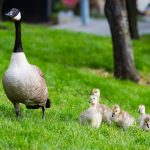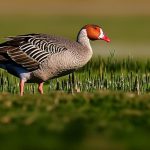Having geese in your yard can be a beautiful sight, but it can also come with its challenges. Geese are attracted to yards for various reasons, such as the availability of food, water, and nesting sites. In this article, we will explore the different ways geese can be attracted to your yard and discuss effective strategies to manage their presence.
Key Takeaways
- Geese are attracted to yards with open spaces, water sources, and easy access to food.
- Geese can cause damage to property, create health hazards, and be aggressive towards humans and pets.
- Natural deterrents include planting certain types of vegetation, using noise makers, and applying repellent sprays.
- Physical barriers like fences, netting, and spikes can be effective in keeping geese out.
- Decoys and scare tactics like motion-activated sprinklers and predator replicas can also be used to repel geese.
Understanding why geese are attracted to your yard
Geese are attracted to yards for several reasons. One of the main factors is the availability of food. Geese are herbivores and feed on grass, plants, and grains. If your yard has a lush green lawn or a garden with plenty of vegetation, it can be an attractive feeding ground for geese.
Another reason why geese are attracted to yards is the presence of water sources. Geese need water for drinking and bathing, so if you have a pond, lake, or even a birdbath in your yard, it can be a magnet for these birds.
Geese also choose their nesting sites based on certain criteria. They prefer areas that are close to water and have good visibility to spot predators. If your yard meets these requirements, it may become a potential nesting site for geese.
The negative impact of geese in your yard
While having geese in your yard may seem charming at first, they can cause several problems. One of the main issues is the damage they can do to your lawn and landscaping. Geese feed on grass and plants, which can result in patches of dead or damaged vegetation.
Another concern is the accumulation of goose droppings. Geese produce a significant amount of droppings, which can be unsightly and difficult to clean up. Moreover, goose droppings contain bacteria that can pose health risks to humans and pets. They can also contaminate water sources and contribute to poor water quality.
Natural ways to deter geese from your yard
If you want to deter geese from your yard without resorting to harmful methods, there are several natural strategies you can try. One effective approach is to make your yard less attractive to geese by removing their food sources. This can be done by regularly mowing your lawn, removing fallen fruits or seeds, and using bird feeders that are designed to exclude larger birds like geese.
Another natural deterrent is the use of plants and landscaping techniques that discourage geese. Geese prefer open spaces with good visibility, so planting tall grasses or shrubs can create barriers that make your yard less appealing to them. Additionally, installing rocks or gravel around water sources can make it difficult for geese to access the water.
Installing physical barriers to keep geese out
If natural deterrents are not effective, you may consider installing physical barriers to keep geese out of your yard. One option is to install a fence around your property. Make sure the fence is at least three feet high and has a top that slopes outward to prevent geese from flying over it.
Another option is to use netting or wire mesh to cover areas where geese are likely to gather, such as ponds or gardens. This will prevent them from accessing these areas while still allowing other wildlife to pass through.
Using decoys and scare tactics to repel geese

Decoys and scare tactics can be effective in deterring geese from your yard. One common decoy is a plastic owl or hawk placed in a prominent location. The presence of these predators can scare away geese and prevent them from nesting in your yard.
Other scare tactics include using noise-making devices like wind chimes or motion-activated sprinklers. These sudden noises and movements can startle geese and discourage them from staying in your yard.
Consistently maintaining a clean and uninviting yard
Consistently maintaining a clean and uninviting yard is crucial in managing geese infestations. Regularly remove fallen fruits, seeds, and other food sources that may attract geese. Keep your lawn well-maintained by mowing it regularly and removing any dead or damaged vegetation.
It is also important to clean up goose droppings promptly. Use a shovel or rake to remove the droppings and dispose of them properly. Avoid using high-pressure water sprays to clean the droppings, as this can spread bacteria and contaminate the surrounding area.
Seeking professional help to manage geese infestations
If you are facing a severe geese infestation or if your efforts to manage them have been unsuccessful, it may be necessary to seek professional help. There are wildlife management companies that specialize in geese control and can provide effective solutions tailored to your specific situation.
Another option is to contact your local government or wildlife agency for assistance. They may have programs in place to help homeowners deal with geese infestations and can provide guidance on legal and ethical methods of control.
Legal considerations when dealing with geese on your property
When dealing with geese on your property, it is important to be aware of the legal considerations. In many areas, geese are protected under federal or state laws, and it is illegal to harm or kill them without proper permits.
Before implementing any control measures, make sure to familiarize yourself with the laws and regulations that apply in your area. Consult with local authorities or wildlife agencies to ensure that you are in compliance with the law while managing geese on your property.
Educating your neighbors on how to keep geese away
Managing geese in your yard can be more effective if you work together with your neighbors. Geese are mobile creatures and can easily move from one property to another. By educating your neighbors on how to keep geese away, you can create a more effective barrier against these birds.
Organize community meetings or distribute informational flyers to educate your neighbors on the negative impact of geese and the different strategies for deterring them. Encourage them to implement similar measures in their yards to create a unified front against geese infestations.
Creating a bird-friendly space that doesn’t attract geese
Creating a bird-friendly space in your yard doesn’t have to mean attracting geese. By implementing certain strategies, you can create an environment that is attractive to other bird species while discouraging geese from staying.
Plant native vegetation that provides food and shelter for other bird species. Install bird feeders and birdbaths that are designed to exclude larger birds like geese. By creating a diverse and inviting habitat, you can attract a wide variety of birds while minimizing the presence of geese.
Managing geese in your yard requires a combination of strategies that are effective, humane, and legal. By understanding why geese are attracted to your yard and implementing natural deterrents, physical barriers, scare tactics, and proper maintenance, you can minimize the negative impact of geese and create a more enjoyable outdoor space. If necessary, seek professional help and educate your neighbors on how to manage geese in their yards as well. With these efforts, you can maintain a beautiful yard while keeping geese at bay.
If you’re looking for effective ways to keep geese out of your yard, you might find this article on Poultry Wizard helpful. It provides valuable insights and tips on how to deter geese from invading your property. From using decoys and repellents to creating physical barriers, this article offers various strategies to protect your yard from unwanted feathered visitors. Check it out here for practical solutions to keep geese at bay.
FAQs
What are some effective ways to keep geese out of my yard?
There are several effective ways to keep geese out of your yard, including installing physical barriers such as fences or netting, using decoys or scare tactics, and modifying the landscape to make it less attractive to geese.
Why do geese come into my yard?
Geese are attracted to yards and other open spaces because they provide easy access to food, water, and shelter. They may also be attracted to areas with large bodies of water nearby.
Are geese dangerous?
While geese are generally not aggressive towards humans, they can become territorial and defensive if they feel threatened or if their young are nearby. They may hiss, flap their wings, or charge at perceived threats.
What are some common problems associated with geese in yards?
Some common problems associated with geese in yards include damage to landscaping and gardens, fouling of sidewalks and other surfaces with droppings, and noise pollution from honking and other vocalizations.
Are there any legal restrictions on removing geese from my yard?
In many areas, geese are protected by law and may not be removed or harmed without a permit. It is important to check with local authorities before taking any action to remove geese from your yard.
Meet Walter, the feathered-friend fanatic of Florida! Nestled in the sunshine state, Walter struts through life with his feathered companions, clucking his way to happiness. With a coop that’s fancier than a five-star hotel, he’s the Don Juan of the chicken world. When he’s not teaching his hens to do the cha-cha, you’ll find him in a heated debate with his prized rooster, Sir Clucks-a-Lot. Walter’s poultry passion is no yolk; he’s the sunny-side-up guy you never knew you needed in your flock of friends!







